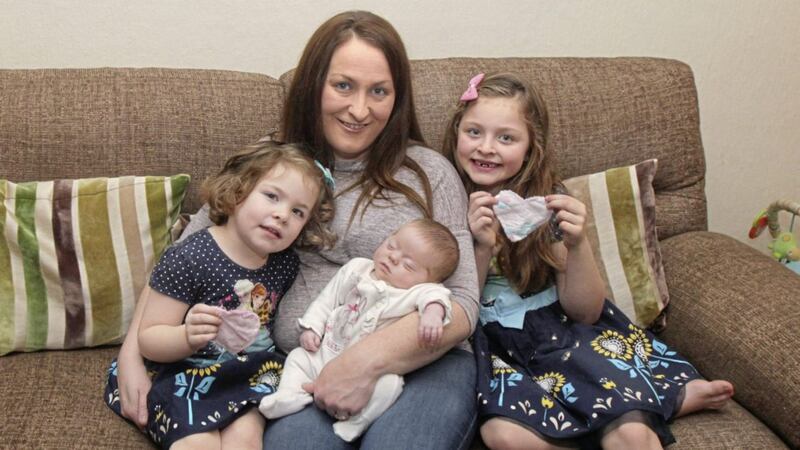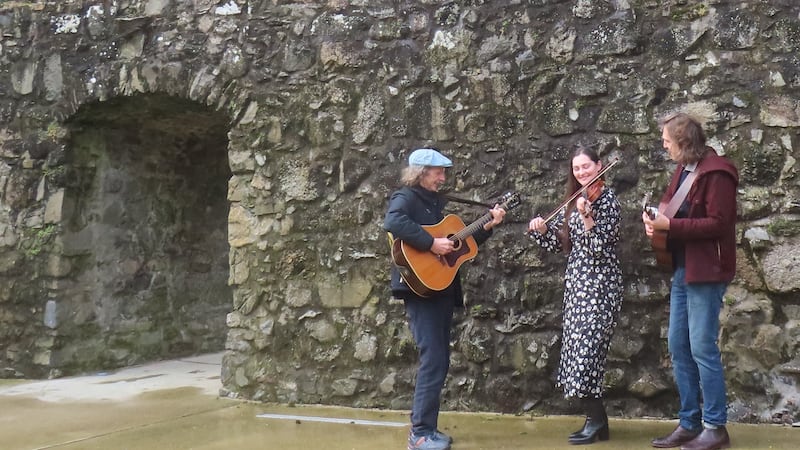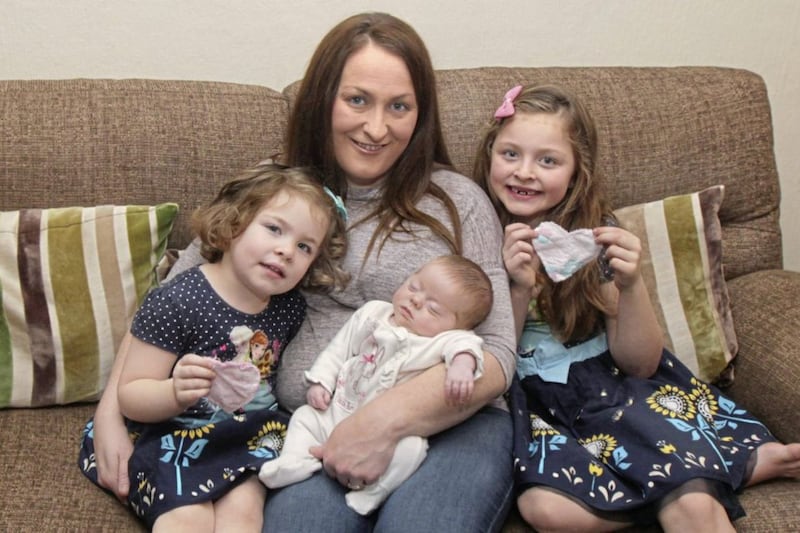THIS will be an extra special Christmas for the Baines family, from Co Tyrone, as they celebrate the festive season at home as a family of five. The youngest member of the family, Nancy, was born at just 34 weeks and spent six weeks in neonatal intensive care following an infection.
It has been a long journey for Nancy and her family, but it has been helped by the care and attention of the staff at Antrim Area Hospital's neonatal unit, as well as a band of crafters from Broughshane, who played an important role in encouraging bonding between mum and baby.
The entire pregnancy was a difficult time for mum Louise Baines, from Kildress, who has two other daughters Grace (7) and Caoimhe (3). "I was sick up to 10 times a day; the other two pregnancies were a doddle," she laughs.
Due her sickness Louise was admitted to Craigavon Area Hospital for dehydration and additional tests showed intermittent blood supply to the placenta. Three weeks of daily visits to Craigavon followed and when foetal scans showed Nancy hadn't grown, doctors decided she needed to be delivered as soon as possible.
However, due to 28-week-old twins having just been born in Craigavon, there were no intensive care beds available at the hospital's neonatal unit, and Louise was told to be prepared to travel to Glasgow to give birth.
"Thankfully a bed became available at Antrim and I was taken there by ambulance to be induced," she recalls with relief.
Progress in labour was slow – mainly due to Louise's anxiety over what would happen the baby when she was delivered.
"Not knowing was the scariest part for me. I was given the opportunity to look around the neonatal unit – and I would recommend this to others if possible. It's daunting when you first walk in with wires everywhere and monitors beeping, but it definitely put me at ease," says Louise.
Nancy Baines was born at 2.33am on October 21, weighing just 3lb and 7 oz.
"She was actually bigger than I expected. She was very long at 42cm but extremely thin and had huge googy eyes," recalls her proud mum.
Louise's husband Adam went with their daughter to the newly refurbished 16-cot neonatal unit at Antrim Area Hospital, while she recovered.
While neonatal care has happily come on by leaps and bounds in the past decade, mother-baby bonding is still crucial. This is not always immediately achievable due to premature babies' dependency on hi-tech monitors and respiratory assistance. However, through an innovative UNICEF initiative that encourages the link between the new mothers and their babies involving two cloth hearts measuring a few inches across, bonding can take place.
The day after her birth, Louise was able to hold her daughter for a short time but, to her dismay, breastfeeding wasn't as easy as with her other two daughters, due to the lack of skin-to-skin contact.
The hearts are made by the Just Sew voluntary group in Broughshane. When the premature baby is admitted to hospital, he or she is given two hearts made of a soft material. One is worn by the infant, one by the mother, next to their skin.
When visiting her baby in the neonatal unit, mum is encouraged to swap hearts with the baby, so that they become used to each other's smell, a crucial part of the bonding process. This helps to promote a close and loving relationship between mother and child at a very difficult time.
"Although Nancy was doing really well and didn't need oxygen, she was still not flourishing. This was partly because I was struggling with my milk, expressing enough to feed her was difficult so the nurse suggested these cloth hearts."
Louise wore one, as did Nancy, then they swapped the pretty bits of material, now impregnated with their smell. Louise recalls that the reaction was instant, and positive.
"The staff advised that when expressing milk I should have a picture of her and keep the heart beside me. Immediately, I felt my body stimulated by the smell of her.
"What was lovely was that I was also able to take the heart home and show her sisters who couldn't see their sister yet, but could touch the heart she'd wore and smell her," adds Louise, who now has the hearts safely tucked away in Nancy's baby memory book.
Neonatal clinical sister Lorraine McClenaghan welcomes the use of the cloth hearts. "Scents are transferred via the hearts which are exchanged regularly," she says. "This in turn can help breast milk production for mum. Human milk is more than just a meal, it is the gold standard in neonatal nutrition. It should always be viewed as a life-saving medication for fragile infants, and an essential part of premature baby care."
Whilst she was feeding well within a week, little Nancy developed a bacterial infection and had to receive intravenous antibiotics for another five weeks.
"It was very scary and she was like a wee pin cushion," recalls her mum, who was extremely grateful to the care of the staff in the neonatal unit. "They were like family. I couldn't have asked to be in a better place. The staff were amazing. Whenever I wanted to cry I could cry, but there was also good craic at times."
Now weighing 7lb, a healthy baby Nancy is the greatest gift the Baines family could have received and they are looking forward to Christmas together.



